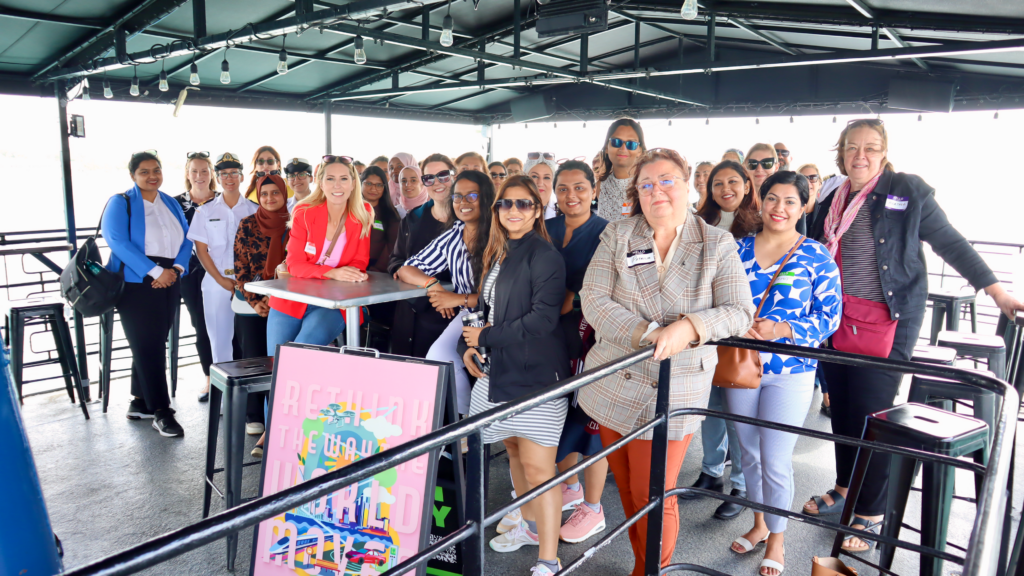Home » Exploring Windsor Port by Boat: Air Land and Sea Trifecta Completed – Women in Mobility Experience
Exploring Windsor Port by Boat: Air Land and Sea Trifecta Completed – Women in Mobility Experience

Since our group began, WEtech’s Women in Mobility Peer Group has provided its members with a series of unique, behind-the-scenes experiences that highlight key infrastructure and transportation assets in our region. We’ve had the privilege of touring the Windsor International Airport, exploring the construction site of the Gordie Howe International Bridge, and even getting an exclusive look at the Windsor-Detroit Tunnel. These meetups offer our members unparalleled access to the people, organizations, and projects shaping mobility in Windsor-Essex and beyond, allowing us to learn, connect, and collaborate in meaningful ways.
Powered by Invest WindsorEssex and FedDev Ontario, this September, attendees of the Women in Mobility (WiM) Peer Group had the unique opportunity to explore the Windsor Port in a way that many have never seen before – by boat! Hosted by Windsor Premium Cruises, we sailed along the riverfront, passing iconic landmarks like the Ambassador Bridge and the soon-to-be-completed Gordie Howe International Bridge. Along the way, we learned about key operations and facilities such as the HMCS Hunter, Sterling Fuels (the largest marine fueling depot on the Great Lakes), and Archer Daniels Midland’s (ADM) $80 million transformation.
I can speak on behalf of many members who shared that this experience was great to shed light on the many roles that Port Windsor plays in moving key commodities such as salt, steel, aggregates, and marine fuels, while supporting major infrastructure projects like the Gordie Howe International Bridge and NextStar Energy.
Did You Know?
- Port Windsor employs over 1,000 people across its terminals.
- It’s the third-largest Canadian port on the Great Lakes, moving over 4 million tons of cargo annually.
- The port processed $400 million in goods last year, and is strategically located at the heart of the St. Lawrence Seaway, providing access to 30 million people in a $4.5 trillion economy.
- Windsor Salt ensures road salt supplies for Ontario and the American Midwest are sold up to two years in advance!
- ADM Windsor is North America’s largest producer of oilseeds, supplying protein meal and vegetable oils for the food and industrial sectors.
A special shoutout to the dedicated team that made this day possible, including Patricia Leblanc Jaeger, Steve Salmons, Peter Berry, Suhair Qashou, Paul and Tami Mancini, and many more.
Our members and guests had many questions for the Windsor Port Authority (WPA). Here are some key takeaways from the Q&A:
Career Opportunities:
What types of jobs are available within the Windsor Port Authority and the broader maritime industry? Jobs in the WPA vary depending on the terminal and activities. Opportunities range from business and engineering roles to skilled trades. The industry is also facing a significant shortfall in mariners and cargo planning personnel, as many will be retiring in the next 5-10 years.
Technology & Innovation:
What upcoming trends are shaping the port and maritime sectors? Key advancements include traffic management and route optimization, data collection and analysis, and the development of autonomous vessels and dock equipment. There is a push towards the electrification of docks and the use of EIS/GIS for vessel and cargo tracking. Some exciting discussions are happening around creating living labs for emerging technologies, inspired by the Port of Monroe’s partnership with Newlab.
Diversity & Inclusion:
How is the port addressing diversity and inclusion? The WPA itself has a 50% female staff, and industry-wide programs like the Canadian Marine Careers Foundation are promoting the entry of women and underrepresented groups into the sector.
Career Advice:
What advice would you give to someone interested in a maritime career? It’s crucial to develop strong communication, creative problem-solving, and research skills. Additionally, understanding emerging technologies, such as those tied to environmental sustainability (COP26) and international regulations, will be essential.
Industry Insights:
What makes Port Windsor unique? Port Windsor is the only federal port in the U.S.-Canada border, giving it a strategic advantage for international trade. Looking ahead, exciting innovations like biodiesel, autonomous vessels, and increasing female representation will transform the industry.
What’s Coming Up from WiM and Friends?
There are several events happening this Fall that may be of interest.
- HMCS Hunter has an action-packed weekend planned where you can explore exciting career opportunities and experience the life of a sailor up close. Hosted by the Royal Canadian Navy, Canadian Coast Guard, and the Canadian Marine Careers Foundation, this event is perfect for anyone curious about a future in the maritime industry or wanting to see what it’s like on the water. DETAILS: https://www.canada.ca/en/navy/campaigns/events/mce-24.html#dates
- Women in Mobility Peer Group is proud to be hosting our 3rd annual Women Driven Mobility YQG Breakfast on October 17th at 8 AM at the Mackenzie Hall Cultural Centre. We’re thrilled to welcome Josipa Petrunic, President & CEO of CUTRIC, as our keynote speaker. She’ll delve into innovative urban transport, smart vehicles, and sustainable cities, offering insights into the future of mobility. Following the keynote, don’t miss the fireside Q&A, moderated by Anneke Smit, Founding Director of the University of Windsor Law’s Centre for Cities. DETAILS: https://www.eventbrite.ca/e/983951935727?aff=oddtdtcreator
WEtechAlliance
https://www.WEtech-alliance.com/
WEtech Alliance has served as a catalyst for technology and innovation in the Windsor-Essex and Chatham-Kent, Ontario regions since 2011. We’re a non-profit organization that provides entrepreneurs and companies with business services, training, I.P. and commercialization support, mentorship and strategic connections to help bring new ideas to market, scale to the next level and build a dynamic culture and a community of innovation.


